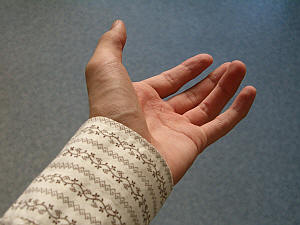Patience…
Friends…
Warren Buffett: ¿Para que sirve el dinero?
Hubo una entrevista de una hora en CNBC con Warren Buffett, la segunda persona más rica del mundo, quien donó $31 mil millones de dólares para caridad. He aquí algunos aspectos muy interesantes de su vida:
- Compró su primera acción a los 11 años y se lamenta de haber empezado demasiado tarde!
- Compró una pequeña granja a los 14 años con sus ahorros provenientes de repartir periódicos.
- Todavía vive en la misma pequeña casa de 3 cuartos en Omaha que compró luego de casarse hace 50 años. Él dice que tiene todo lo que necesita en esa casa. Su casa no tiene ningún muro o reja.
- Él maneja su propio carro a todas partes y no anda con chofer o guardaespaldas.
- Nunca viaja en jet privado, a pesar de ser el dueño de la compañía de jets privados más grande del mundo.
- Su compañía, Berkshire Hathaway, es dueña de 63 compañías. Él le escribe sólo una carta cada año a los CEOs de estas compañías, dándole las metas para el año. Nunca convoca a reuniones o los llama regularmente. Él le ha dado dos reglas a sus CEOs:
Regla número 1: No perder nada del dinero de sus accionistas.
Regla número 2: No olvidar la regla número 1. - Él no socializa con la gente de la alta sociedad. Su pasatiempo cuando llega a casa es prepararse palomitas de maíz y ver televisión.
- Bill Gates, el hombre más rico del mundo, lo conoció apenas hace 5 años. Bill Gates pensó que no tenía nada en común con Warren Buffett. Por esto, programó la reunión para que durara únicamente media hora. Pero cuando Gates lo conoció, la reunión duró diez horas y Bill Gates se volvió un devoto de Warren Buffett.
- Warren Buffet no anda con celular ni tiene una computadora en su escritorio.
- Su consejo para la gente joven:
Aléjese de las tarjetas de crédito e invierta en usted.
RECUERDE:
El dinero no crea al hombre, sino que fue el hombre el que creó el dinero
La vida es tan simple como usted la haga.
No haga lo que los otros digan. Escúchelos, pero haga lo que lo hace sentir mejor.
No se vaya por las marcas. Póngase aquellas cosas en las que se sienta cómodo.
No gaste su dinero en cosas innecesarias. Gaste en aquellos que de verdad lo necesitan.
Después de todo, es su vida. ¿Para qué darle la oportunidad a otros de manejársela?
Si el dinero no sirve para compartirlo con los demás, entonces ¿para que sirve?
AYUDE AUNQUE NO PUEDA HACERLO; SIEMPRE HABRÁ BENDICIÓN PARA AQUELLOS QUE SABEN COMPARTIR.
Lunar Letter / The Boomerang Effect
 Daily we face a vast array of decisions. Differentiating between doing what is “right” and “wrong” is a matter of perception and not always easy. Often our biggest challenge is to take action and do something. In making these decisions we can keep in mind our actions affect many, near and far.
Daily we face a vast array of decisions. Differentiating between doing what is “right” and “wrong” is a matter of perception and not always easy. Often our biggest challenge is to take action and do something. In making these decisions we can keep in mind our actions affect many, near and far.
 Our instincts have one objective, to reproduce and continue to exist. Frequently, we believe our desire to put ourselves ahead of others is necessary for our survival. The lion in the jungle standing to the side and lets the other lions eat first won’t last for very long. He will soon be history. Though we may view our circumstances as our own special jungles, we are not lions nor do we live in the lion’s jungle!
Our instincts have one objective, to reproduce and continue to exist. Frequently, we believe our desire to put ourselves ahead of others is necessary for our survival. The lion in the jungle standing to the side and lets the other lions eat first won’t last for very long. He will soon be history. Though we may view our circumstances as our own special jungles, we are not lions nor do we live in the lion’s jungle!
As human beings, we have marvelous minds which allow us to analyze and think of alternative actions. People who think only of themselves may achieve much at the expense of others, though they are likely to lead barren lackluster lives.
Fortunately, there is another way to achieve our desire. This includes fame, fortune, relationships and anything else, be it emotional or material. The key is to be useful to others because when we help others get what they want, we eventually get what we want.
Let’s look at the analogy of a boomerang. We throw it and it comes back to us. While this works in theory, for those who have actually thrown a boomerang, it doesn’t always work in practice. If we don’t know how to use the boomerang, the results can be quite unexpected. If we throw it poorly, we can break a window or hit somebody in the head. When we learn how to work the boomerang, we can improve our results.
In many cases we give “good” or “bad” without realizing what we are doing. It is simply part of our daily activity and not intended as “good” or “bad.” In this case, the boomerang we throw will likely arrive someplace unknown because we are unaware of what we are doing.
 As time passes, we grow in mind, body, spirit and experience. It is then when we often give “good” or “bad,” fully aware of our actions, though not necessarily the consequences. We know, for example, if we pick up our trash after an outing in the park, others who come after us will find the place nice and clean. Likewise, we know if we do not pick up our trash, those who come later will find the place disagreeable and dirty. While this is not always the case and some don’t think twice about leaving trash, they aren’t necessarily doing it to be bad, often they are simply unaware of the consequences of what they are doing.
As time passes, we grow in mind, body, spirit and experience. It is then when we often give “good” or “bad,” fully aware of our actions, though not necessarily the consequences. We know, for example, if we pick up our trash after an outing in the park, others who come after us will find the place nice and clean. Likewise, we know if we do not pick up our trash, those who come later will find the place disagreeable and dirty. While this is not always the case and some don’t think twice about leaving trash, they aren’t necessarily doing it to be bad, often they are simply unaware of the consequences of what they are doing.
We are all human and we all make mistakes. If only we could prevent the havoc we create. It is the evil we commit consciously which is ultimately the most damaging. When we know we are doing wrong, the boomerang will go its course and eventually return to deliver its devastating blow.
Similarly, it is possible to do the right thing without knowing it’s right. In this case, we throw the boomerang and the positive effect falls on someone without our intention. Better yet is to do the right thing intentionally because the boomerang will positively affect those in its path before returning to us with sensational results.
Doing the right thing rarely costs money or resources and it can be something as simple as a smile. The results on own lives and those of others multiply and compound exponentially. Throwing a boomerang full of positive energy and spirit regularly is the best way to achieve the results we desire.
∞ Rob McBride ∞
LL II 11
Divine Beauty in Learning…
There is divine beauty in learning, just as there is human beauty in tolerance. To learn means to accept the postulate that life did not begin at my birth. Others have been here before me, and I walk in their footsteps. The books I have read were composed by generations of fathers and sons, mothers and daughters, teachers and disciples. I am the sum total of their experiences, their quests. And so are you.
~ Elie Wiesel
Lunar Letter / El Efecto Bumerang
 Haz el bien y no mires a quien. Muchos sabemos este refrán aunque ponerlo en práctica no siempre es tan fácil.
Haz el bien y no mires a quien. Muchos sabemos este refrán aunque ponerlo en práctica no siempre es tan fácil.
 Nuestros instintos tienen un solo objetivo, reproducirse y seguir existiendo. Frecuentemente, este deseo de colocar nuestras necesidades primero es imprescindible para sobrevivir. Un león en la selva que deja que los otros leones coman primero no va a durar por mucho tiempo y pronto será historia. Aún así, no vivimos en la selva y ¡tampoco somos leones!
Nuestros instintos tienen un solo objetivo, reproducirse y seguir existiendo. Frecuentemente, este deseo de colocar nuestras necesidades primero es imprescindible para sobrevivir. Un león en la selva que deja que los otros leones coman primero no va a durar por mucho tiempo y pronto será historia. Aún así, no vivimos en la selva y ¡tampoco somos leones!
Como seres humanos tenemos el don de una mente maravillosa que nos permite analizar y pensar en distintas alternativas. La persona que sólo piensa en sí mismo puede lograr mucho a costa de los demás. Aún así, es probable que viva una vida vacía y carente de lo más bonito que ofrece la vida.
Afortunadamente, hay otra manera de lograr todo lo que nosotros queremos. Esto incluye dinero, fama, relaciones y cualquier otra cosa material o emocional. La clave es ser útil a los demás. Es una ley que tarde o temprano nunca falla, cuando nosotros damos, recibimos.
Piensa en la analogía de un bumerang. Cuando nosotros lo tiramos, se devuelve. Aunque en teoría esto funciona, para los que han jugado con un bumerang, ¡en la práctica no siempre es así! Si no sabemos tirar el bumerang, el resultado puede ser indeseado. Si lo tiramos mal puede ser que rompa un vidrio o le pegue a alguien en la cabeza. Cuando aprendemos a manejar el bumerang, podemos mejorar los resultados.
En muchos casos damos bien o mal sin darnos cuenta de lo que estamos haciendo. Simplemente forma parte de nuestras acciones diarias y lo hacemos sin intención. En este caso lo más probable es que el bumerang que lancemos llegue a un lugar desconocido porque no sabemos lo que estamos haciendo.
Al contrario, con el pasar del tiempo y la experiencia, es frecuente que demos bien o mal conscientes de lo que estamos haciendo. Sabemos por ejemplo que si recogemos nuestra basura después de estar en un parque que la próxima persona que llegue encontrará un lugar lindo. De la misma forma sabemos que si dejamos la basura, la próxima persona que llegue encontrará un lugar desagradable. También es cierto que existen personas que ni siquiera piensan dos veces en recoger su basura. No actúan necesariamente por ser malos, sino porque no han aprendido otro comportamiento.
Todos somos humanos y todos cometemos errores. ¡Ojala pudiéramos prevenir todos los males que causamos! Los errores que cometemos sin querer no son los más dañinos, sino los que ejecutamos conscientemente que alguien se va a perjudicar por lo que hayamos hecho. Cuando sabemos que estamos haciendo mal, no cabe duda que tarde o temprano regresará el bumerang para pegarnos en la cabeza con toda su fuerza.
 De la misma forma, es posible hacer cosas buenas sin darnos cuenta que son buenas. En este caso tiramos el bumerang y llega con un buen efecto a alguien aunque no sea nuestro objetivo. Lo mejor es hacer el bien conscientemente sabiendo que en el camino el bumerang afectará a otros positivamente antes de regresar a nosotros con un impacto positivo.
De la misma forma, es posible hacer cosas buenas sin darnos cuenta que son buenas. En este caso tiramos el bumerang y llega con un buen efecto a alguien aunque no sea nuestro objetivo. Lo mejor es hacer el bien conscientemente sabiendo que en el camino el bumerang afectará a otros positivamente antes de regresar a nosotros con un impacto positivo.
Las acciones positivas que podemos dar al mundo suelen ser “baratas” y no es necesario gastar mucho dinero o mucho esfuerzo. Aun así, su efecto se multiplica sobre nuestra vida y las de los demás incrementándose exponencialmente. Tirar el bumerang haciendo el bien sin mirar a quien es la mejor forma de recibir algo bueno, barato y bonito.
∞ Rob McBride ∞
LL II 11

